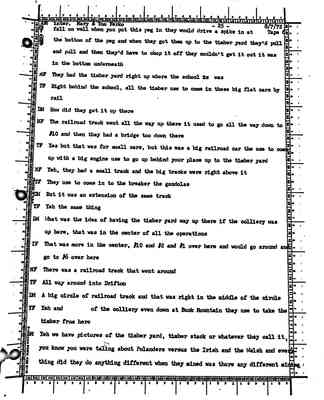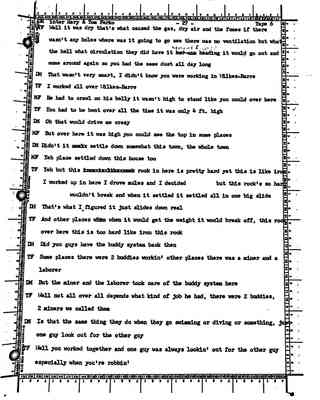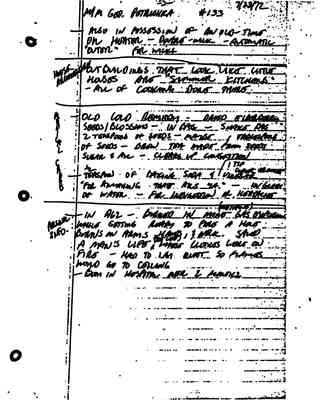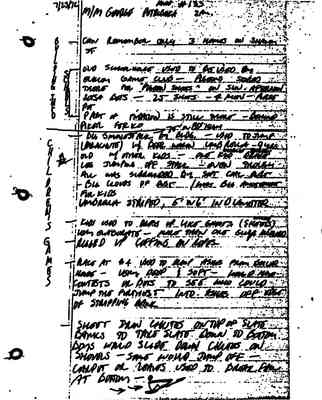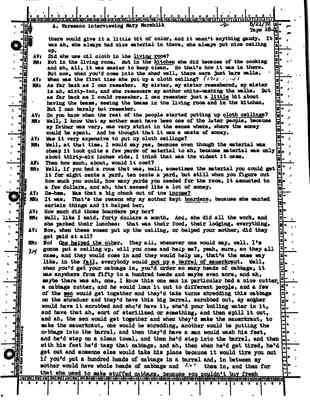Pages That Need Review
Vol. 1-Interviews-Ferko
page_0027
inter. Mary & Tom Ferko -25- 8/7/72 DM fall on well when you put this peg in they would drive a spike in at the bottom of the peg and when they got them up to the timber yard they's pull and pull and then they'd have to chop it off they couldn't get it out it was in the bottom underneath MF They had the timber year right up where the school was TF Right behing the school, all the timber use to come in these big flat cars by rail DM How did they get it up there MF The railroad track went all the way up there it used to go all the way down to #10 and then they had a bridge too down there TF Yes but that was for small cars, but this was a big railroad car the use to come up with a big engine use to go up behind your place up to the timber yard MF Yeh, they had a small truck and the big tracks were right above it TF They use to come in to the breaker the gondolas DM But it was an extension of the same track TF Yeh the same thing DM What was the idea of having the timber yard way up there if the colliery was up here, that was in the center of all the operations TF That was more in the center, #10 and #2 and #1 over here and would go around and go to #6 over here MF There was a railroad track that went around TF All way around into Drifton DM A big circle of railroad track and that was right in the middle of the circle TF Yeh and of the colliery even down at Buck Mountain they use to take the timber from here DM Yeh we have pictures of the timber yard, timber stack or whatever they call it, you know you are taling about Polanders versus the Irish and the Welsh and everything did they do anything different when they mined was there any different mining
page_0029
inter Hary & Tom Ferko -27- Tape 6
TF: Well it was dry that's what caused the gas, dry air and the fumes if there wasn't any holes where was it going to go see there was no ventilation but what the hell what circulation they did have it heading it would go out and come around again so you had the same dust all day long DM: That wasn't very smary, I didn't know were working in Wilkes-Barre TF: I worked all over Wiles-Barre MF: He had to crawl on his belly it wasn't high to stand like it was over here TF: You had to be bent over all the time it was only 4ft. high DM: Of that would drive me crazy MF: But over here it was high you could see the top in some places DM: Didn't is settle down somewhat this town, whole town MF: Yeh the place settled down this house too TF: Yeh but this rock in here is pretty hard yet this is like iron I worked up in here I drove mules and I decided but this rock's so hard wouldn't break and when it settled it settled all in one big slide DM: That's what I figured it just slides down real TF And the other places when it would get the weight it would break off, this rock over here this is too hard like iron this rock DM: Did you guys have the buddy system back then TF: Some places there were 2 buddies workin' other places there was a miner and a laborer DM: But the miner and the laborer took care of the buddy system here TF: Well not all over all depends what kind of job he had, there were 2 buddies, 2 miners we called them DM: Is that the same thing they do when they go swimming or diving or something, just one guy look out for the other guy TF: Well you worked together and one guy was always lookn' out for the other guy especially when you're robbin'
Vol. 2.-Interview-Gaffrey
2
Angela Varesano 6/20/72 Mr. & Mrs. James Gaffney
Mr. Gaffney first worked in the mines in 1924. At age fourteen he started as a sand boy on the Penn Pailroad. He brought up the sand to the box. Sand was used to brake the train by sprinkling it on the tracks. He drove the mules, later in the mines. He also worked as a "top man" as a truck driver and hitcher. A topman worked outside the mines, eight hours a day for $4.62 a day. A wide run is a run of twenty to thirty cars of coal in the mines.
The rectory was occupied by the Roarty's in his mother's time. Billy Coil and his family lived there for fifty-two years. The O'Donnells lived there for fourteen years.
On the Mollie Maguires: One of the Buck Mountain beer gardens was used as a meeting place. He says, "They say there's quite a few bodies there."
"You mean beneath the floor boards?"
"Yes." (Nods.)
His grandfather hid for four weeks in a potato patch when he quit the organization. He was Secretary-Treasurer. John McHugh came to Eckley from Donegal at five years of age. He lived at #7.
The McGraw Funeral Home on Washington Street in Freeland has a High Episcopalian Church similar in style to the Protestant churches in Eckley.
The schoolhouse was a one-floor building with four or six rooms, up to the fourth grade. The teachers were, first through eighth with sixth and seventh combimed: Miss Brislan 2 Miss Corra, 3Anna Gaffney, 5Gracie Denion, John Coil, and John O'Donnell.
Worked in the timber yard When he worked at #2, there was a phonograph in the mines. Pat Fatula brought it in: it played music which echoed throughout the mine. Jim Crabtree put a stop to it.
The Eckley bell is at the Holy Dormition Monastery, hanging in the grove.
Eckley was at one time all Irish. The Catholic Church was built in 1854. The German's came in the late 1800's. In the early 1900's Henry Jayn was a mine boss. A Portuguese group of mine workers lived at the #5 breaker, between Pinkash and #6.
3
Angela Varesano 11:00 - 12:00 pm. Mrs. James Gaffney age 62 6/22/72 Anna (Campbell) Gaffney In 1936 they came to Eckley. Been in Sandy Valley, on a farm. Mr. Gaffney - 1924 ....1st worked in mines On Central Pen RR as a sand boy-- brought sand up to box He was 14 years old. Then, ([? ] also later mules,) ( Lehigh, crossed out)worked at "topman." --truck driver & hitcher. topman-- a man who worked outside mines. Worked 8 hours for $4.62/day. Worked as a (?) Wide run--a run of 20--30 (?)
Rectory 1. Billy Coil & family For 52 yrs. O'Donnells 19 years
Vol. 2-Interview-Nagle
2
Waln Brown interviewing WIlliam Nagle 8/21/72 Tape 5-2
WB: How are you doing, Mr. Nagle?
WN: Pretty good.
WB: Are you waiting for the mailman? You have to make some money.
WN: You have to work hard for money before, today you don't have to work hard you can take it easy, you see, these people have too much money today, that's right.
WB: Well a lot of people do you're right there, how about you or me tho?
WN: No I worked hard for my money and din't make much you work in the mines all these years you would know how hard you work, you wouldn't work, you wouldn't work one day.
WB: Oh I don't know, I've done some pretty hard jobs.
WN: Yeh, you'd say the hell with this job, there's a fellows come and work over here that worked in the city and factories they worked one day and "Which way us to go home," "Why?" "I want to know I want to go home
WB: Would a lot of men come in to town and do that, they couldn't take the work?
WN: It took hard work so he'd work 2, 3 hours, "Oh gee I ain't want that kind of job," he'd go, show him the road, "Hey which way you goin' to go," "Oh you go up this way and then go across the other way and then they'd get outside, so you see I, a fellow like this here he went home and when he went you never seen him no more, you know one of those little shoves, they got them numbered them little shovels, you know before the big shovels and he said, "No that's too big of a shovel."
Woman comes on the scene, Susie, and WN starts talking to her.
WN: You know there was 2 men killed one time and this here party said, "You go and tell the priest get the graves," so he went, so the other guy he was a priest too and he went and he said -- because there's 2 men killed and Father said, "Don't bother no you ain't gonna put them in heaven and I ain't goin'g to put them to heaven, but where ever he done he's good and that's the way he was goin' to go, if he done bad, he said he was goin' good enough, you know, save your money he said, because you're only givin' the guy money for nothin; so you see he was savin' his money and said, tomorrow I'll have mass for this guy and the day after I'll have mass for him, but he took the money but the other priest -- he said to himself you can to go heck as long as I get the money, he got for the 2 funerals and he didn't care for the other one he said that's only throwin' money away, now you see that's the way it goes even with the priest -- 16 priests and one would go away and used to have mass he said that man didn't put that man in there, up in heaven God knows where he's goin' maybe he's might go in hell, so you see never depend on somebody else to take your sins.
S: Prayin' and doin' the right thing and if you don't do everything exactly right. God forgives everybody that's why he died on the cross, don't you think?
WN: We say Protestants don't confess, they all go the priest and say, "I'm a sinner," alright and the people go they say why should they be tellin' him my sins?
S: Well, that's the way it's going to be with the Catholics. It going to be like that.
WN: That's the way it goes, I give them money, there was a priest in the Polish church there was a priest that used to be jealous, his cook.
S: That's the Polish for you.
WN: Polish or not Polish might be the same thing
S: ??? their words, and I'm Greek.
WN: So that janitor used to go out when she hang clothes and he'd keep talkin' to her, "Hey what are you doin' over here in this area, you go do your work."
S: But then she left with a young priest and the old priest was left.
Vol. 2-Interview-Pertrushka
4
Angela Varesano ??] 133 Mrs. George Petroushka Fetcko born Drifton
live in [Kere?] [Holy Supper?] 10:00 am -
Parents' way's were even more beautiful than her use - Daddy wouldl take a clean [illegible] part of [untic ?] around 6 [looping go ?] where the horses were + give ( cows #1 in left margin) the horses a treat for their meal, oats, hay. There he'd go across the barn to the cows give them an extra treat. Then he'd carry the untouched water back to the house. Then he'd give the cats milk,a treat for the dogs, & extra corn for the chickens. Bring pot of water in house. Mother would have a clean basin. He'd pot water into basin. She'd put a silver (same each year) into the pan. mother would take handful of bobalki dough and make a small loaf with garlic & honey in (round, 5" diameter] middle. When father came from the barn, he'd take + break the bread & family would line up behind him: oldest son & wife youngest girl grandchildren would hand a piece to each.
5
If there was any left he would put it on table. Then we'd take pan of water. Father told family go and wash your hands. or He & wife would start and he washed hands and put water in face. Would rub hands an dollar - kids couldn't wait. [Ilsa?] was so [?] have money. Dollar is left in pan.
A Daddy would come from barn and bring handful of hay + cow feed [?] or oats wheat rye )take a handful of grain that was stored in barn, and put it under the table (dining room) on the floor] stayed there until after New Years. [Meant ?] Christmas born in a manger in straw in a barn - this was brought in house as a [ ??] of this. Represented Christ born in a manger in a barn. (LIne 9 to line 11 in bracket with number 1.) When this was done, when you'd sit on table, you wouldn't get up. All food was set out on table in pots [?????] All set + nobody [???] *
21
[This page is handwritten]
--5-- 7/23/72
M/M Geo. Petrushka #133
--Also in possession of an old-time oil heater--[two illegible words]--automatic "outer" for mine[?]
HOUSE [illegible word]
Outbuilding that look like little houses are "summer kitchens"
--All of cooking done there
MEDICAL CARE
--Old cold remedy- dried elderberry seeds/blossoms--in bag--shake bag. 2 teaspoons of seeds-maybe 1 tablespoon of seeds--brew tea made from seeds sugar & all--clears up congestion
--1/2 teaspoon of baking soda & 1 tsp cider vinegar "For anything that ails ya"-- in glass of water--for indigestion or headache
PERSONAL INFO
In 1962-- burned in mine (methane) gas explosion while getting ready to fire a hole. Burns on arms, hands, & neck. Saved a man's life (his too), man's clothes were on fire-- had to lay quiet so flames would go to ceiling. --Been in hospital for 2 months
23
[This page is handwritten]
7/23/72 2 pm. Main #133
M/M George Petrushka
BUILDING INFO
--Can remember only 3 names on Shanty St.
SCHOOLS
--Old schoolhouse used to be used by Eckley Game Club-- Pigeons stored there for "Pigeon Shots" on Sun. afternoon lotsa bets--25 shots--4 men-- purse put
Part of fndation[sic] is still there--behind Piker Ferko
CHILDREN'S GAMES
--Big smokestack by bldg (75' or 80' high)--used to jump (parachute) w/ beer wagon umbrella--9 yrs old w/ other kids--one kid broke [2 words written above, illegible] leg jumping off stack--even though all was surrounded by soft coal dust --Big clouds of dust/ was big amusement for kids Umbrella striped, 5' to 6' in diameter
--Kids used to dress up like ghosts (using sheets) very elaborate--more than one guys word -Rigged up coffins on ropes
--Place at #4 used to dump ashes from boiler house-- very deep & soft--would have contests or bets to see who could jump the furthest into ashes off edge of stripping bank
--Sheet iron chutes on top of slate banks to take slate down to bottom. Boys would slide down chutes on shovels--some would jump off--carpet or leaves used to break fall at bottom
[There is a small drawing of a sitting stick man, facing to the right, knees bent. He is sitting in the blade part of a large shovel. His arms are straight in front of him, holding on about half-way up the handle of the shovel]
Vol. 2-Interview-Marshlik
11
A. Varesano interviewing Mary Marshlik 8/21/72 Tape 28-1 there would give it a little bit of color, and it wasn't anything gaudy. It was ah, she always had nice material in there, she always put nice ceiling up. AV: Did she use oil cloth in the living room (underlined)? MM: Not in the living room. But in the kitchen (underlined) she did because of the cooking and ah, all, it was easier to keep clean. So that's how it was in there. But now, when you'd come into the shed well, there were just bare walls. AV: When was the first time she put up a cloth ceiling (1913 xxx) MM: As far back as I can remember. My sister, my sister remembered, my sister is ah, sixty-two, and she remembers my mother white-washing the walls. But as far back as I could remember, I can remember just a little (underlined) bit about having the beams, seeing the beams in the living room and in the kitchen. But I can barely but remember. AV: Do you know when the rest of the people started putting up the cloth ceilings (underlined)? MM: Well, I know that my mother must have been one of the later people, because my father was very, was very strict in the sense where, where the money would be spent. And he thought that it was a waste of money. AV: Was it very expensive to put up cloth ceilings? MM: Well, at that time, I would say yes, because even though the material was cheap it took quite a few yards of material to ah, because material was only about thirty-six inches wide, I think that was the widest it came. AV: Then how much, about, would it cost? MM: Well, if you had a room that was, well, sometimes the material you could get it for eight cents a yard, ten cents a yard, but still when you figure out how much you would, how many yards you needed for the room, it amounted to a few dollars, and ah, that seemed like a lot of money. AV:Um-hmm. Was that a big chunk out of the income (underlined)? MM: It was. That's the reason why my mother kept boarders (underlined), because she wanted certain things and it helped her. AV: How much did those boarders pay her? MM: Well, like I said, forty dollars a month. And, she did all the work, and she packed their lunches: that was their food, their lodging, everything. AV: Now, when these women put up the ceiling, or helped your mother, did they get paid at all? MM: No! One helped the other (underlined). They all, whenever one would say, well, I'm gonna put a ceiling up, will you come and help me?, yeah, sure, so they all came, and they would come in and they would help us, that's the same way like in the fall (underlined), everybody would put up a barrel of saurkraut (underlined). Well, when you'd get your cabbage in, you'd oder so many heads of cabbage, it was anywhere from fifty to a hundred heads and maybe even more, and ah, maybe there was ah, one, I know this one man in particular had a nice cutter, a cabbage cutter, and he would loan it out to different people, and a few of the men (underlined) would get together and they'd take turns shredding this cabbage on the shredder and they'd have this big barrel, scrubbed out, my mother would have it scrubbed and she'd have it, she'd pur boiling water in it, and have that ah, sort of sterilized or something, and then spill it out, and ah, the men would get together and when they'd make the sauerkraut, to make the sauerkraut, one would be shredding, another would be putting the cabbage into the barrel, and then hey's have a man would wash his feet, and he'd step on a clean towel, and then he'd step into the barrel, and then with his feet he'd tamp that cabbage, and ah, then when he'd get tired, he'd get out and someone else would take his place because it would tire you out if you'd put a hundred heads of cabbage in a barrel and, in between my mother would have whole heads of cabbage and xxxx them in, and then for that she used to make stuffed cabbage, because you couldn't buy fresh
